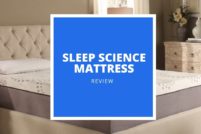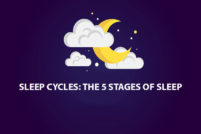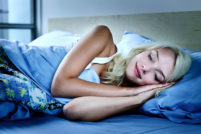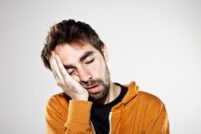Is your addiction preventing you from getting the sleep you need?
Have you entered recovery only to struggle with insomnia and other sleep problems?
When it comes to addiction and sleep, the road goes both ways: Dependence and substance abuse have a negative impact on the quality of sleep, while sleep problems can drive you to seek relief and relapse.
We’ve put together this in-depth guide about how addiction and sleep are interconnected, and how making simple changes to your daily routine can help you sleep better and empower you on your road to recovery.
Types Of Addiction That Affect Sleep

Every addiction has the potential to disrupt your sleep and puts you at risk of developing sleep disorders. However, the type of sleep problems you may experience vary depending on what the focus of your addiction is.
Substance Addiction
In substance use disorders (SUD) the drugs you take directly alter your brain chemistry — changing the levels of chemicals and releasing others that can make sleep difficult to achieve or reduce the quality of sleep.
These issues apply even to substances that have sedating effects such as opiates, alcohol and marijuana. Prolonged use of drugs can alter the structure of sleep and cause physical changes that make it difficult to achieve and maintain sleep. [1]
Good To Know
Substances that are often the center of addiction include:
- Alcohol
- Tobacco
- Cocaine
- Opiates
- Prescription medications
Behavioral Addiction
There are other activities that produce short-term pleasure/reward that can become the center of addiction. These Impulse Control Disorders lead to similar patterns of seeking and performance even when facing adverse consequences as seen in SUD.
While these addictions do not directly alter the brain chemistry as with consumption of psychoactive substances, the process of addiction and dependence is sufficient to disrupt sleep. [2]
Good To Know
Some common behavioral addictions are:
- Gambling
- Food
- Electronics (TV, video games, internet)
- Sex
7 Ways Addiction Can Impact Your Sleep

Addiction will affect your sleep in different ways depending on what type of addiction you have. Each substance that is commonly abused has unique effects on your brain chemistry and sleep cycles. But it’s not just partaking in the addiction behavior that can affect sleep, withdrawal symptoms also often result in even more severe sleep issues. [3]
1. Alter your natural sleep-wake schedule

All types of addiction can lead to a shift in your natural body clock that guides your sleep-wake schedule. Taking stimulant or depressant substances sends conflicting signals to your brain, which over time can cause you to get sleepy or feel awake at the incorrect times of day.
Additionally, many addictive behaviors take place late at night, or you may find that you get so wrapped up in your compulsive behavior that you simply lose track of time. These factors disrupt your sleep schedule, as you start to head to bed at irregular times, confusing your biological clock.
2. Change time spent in sleep stages

Almost all commonly abused drugs suppress specific stages of sleep, including those that make you feel sleepy such as opiates, alcohol and marijuana.
Both drug intake and withdrawal from these substances leads to less time spent in slow-wave and REM sleep — the stages that are essential to feeling rested and rejuvenated upon awakening.
3. Increase time to fall asleep

While obviously being under the influence stimulants such as amphetamines, methamphetamines and cocaine makes it difficult to relax enough to fall asleep, there are other ways addiction can make you lie awake at night.
Even when not under the influence, addiction can keep you up through both the physical aspects of withdrawal and the mental symptoms like anxiety. Behavioral addictions often coincide with anxiety disorders, causing racing thoughts and ruminations that make it feel impossible to achieve sleep.
4. Decrease overall sleep time

People suffering from addiction often experience a decrease in their overall sleep time.
This is due to both sleep fragmentation — frequent switching between sleep stages and awakening often during the night — as well as the inability to stay asleep for a full night.
5. Lower melatonin levels

Melatonin is the main hormone released by your brain to signal to your body that it’s time to sleep. Many substances affect your brain’s chemistry, leading to an imbalance that can disrupt the production this sleep hormone.
In addition, not getting the right light exposure throughout the course of a day due to patterns of behavior surrounding addiction can also mess with your melatonin levels. This is particularly significant for those with electronic-based addictions, as the blue-light emitted by screens suppresses melatonin production.
6. Cause sleep disordered breathing

Depressants such as alcohol and opiates can cause or exacerbate the symptoms of sleep apnea.
Chronic substance abuse can lead to central sleep apnea, whereas any intake of depressants can increase relaxation of tissues in mouth, throat and nose leading to obstructive sleep apnea.
7. Associated with poor sleep hygiene

When your life is centralized around the object/behavior of addiction, you tend to forget to treat yourself with the care and attention you need.
As a result, your overall health suffers and you may find that you lapse into habits that make it even harder to get a good night’s rest.
Learning proper sleep hygiene is a tool you will need to combat your sleeping problems.
How Sleep Impacts Recovery
It’s extremely important to address your sleep problems during the recovery process and into the future. For many people sleep disruption rises to a new, formidable level once they enter treatment and abstain from the object of their addiction. Without a proper plan in place, this alone can lead someone to relapse.
The most common sleep disorder that arises during recovery is insomnia; in fact, according to a study in the Journal of Addiction Medicine, people in recovery are 5 times more likely to suffer from insomnia than the general population.
While these studies have focused on people with SUD, any recovering addict is at risk of developing sleep problems due to the complex psychological issues at play.
People in recovery are 5 times more likely to suffer from insomnia than the general population.
You may only experience short-term sleep issues (during the period of withdrawal from a drug), or your problems may extend for many weeks, months or even years after you’ve achieved abstinence.
This is both due to long-lasting effects of certain substances like alcohol, as well as side-effects of the anxiety and depression that often underlie addiction disorders.
Addiction and sleep disorders feed each other, creating a cycle that is difficult to escape if not treated together. Three factors perpetuate this cycle: [4]
- The object of addiction has been used as a sleep aid in the past.
- The symptoms of anxiety and depression are exacerbated by sleep deprivation, making old coping mechanisms more attractive.
- Sleep deprivation causes “fuzzy thinking” that may result in impulsivity and lowers your tolerance for discomfort.
Breaking the cycle of sleep issues and relapse is essential to successful recovery from addiction.
Forms Of Addiction Induced Sleep Disorders
There are many sleep disorders that can result from an addiction. Which ones you are at risk of developing depends somewhat on whether you are suffering from a substance use disorder or a behavioral addiction, and which drug you are consuming.
We say somewhat because every addiction affects your brain chemistry and can alter your body clock which can lead to an array of different symptoms.
Insomnia
Insomnia is a difficult falling asleep and/or staying asleep. It’s by far the most common of the sleep disorders, and is even 5 times more prevalent in people recovering from addiction than in the general population.
Many things can cause insomnia, from the physical effects of withdrawal to mental health issues and life stress. People recovering from addiction often experience difficulty falling asleep as they are used to using their addiction as a sleep aid.
Hypersomnia (Excessive Daytime Sleepiness)
Hypersomnia can be thought of as the opposite of insomnia: It’s when someone experiences excessive sleepiness throughout the day, maybe even falling asleep for brief moments, called micro-sleeps. [5]
If you regularly use stimulants, you may experience hypersomnia as part of the withdrawal from these drugs. Hypersomnia can also result from sleep deprivation caused by other sleep disorders or mental health issues such as depression.
Sleep Apnea
Sleep apnea causes someone’s breathing to be interrupted while they sleep. These apneas can result from an issue in the brain (central) that prevents the lungs from functioning properly while sleeping, or from a physical obstruction that blocks the flow of air (obstructive).
The use of depressant drugs like opiates and alcohol has been associated with the development of both central and obstructive sleep apnea. While recovery can resolve obstructive sleep apnea, the changes in the brain causing central sleep apnea often require ongoing treatment.
Parasomnias
Parasomnias are a group of sleep disorders that involve abnormal, undesired events or experiences that occur as you are falling asleep, are asleep or while awakening. They can include perceptions, emotions, dreams, movements or even complex behaviors. [6]
These disorders are believed to result from malfunctioning in switching between the different stages of sleep and being awake. Parasomnias may also arise as a symptom of another sleep disorder.
Examples of common parasomnias include:
- REM Sleep Behavior Disorder
- Vivid dreams/Nightmares
If you are regularly using a drug you may develop a Substance Induced Sleep Disorder. Unlike a true sleep disorder, this type directly results from the presence of the drug in your system.
For example, taking opiates or hypnotics can cause extreme sleepiness, while taking stimulants such as cocaine often results in insomnia. This type of sleep disorder resolves once the drug is no longer active. [7]
Substance Induced Sleep Disorders often have a rebound effect once you enter recovery and abstain from the drug in question. This means that in withdrawal you may experience the opposite symptoms of that which the drug caused. [8]
Sleep Medications And Addiction

Experts recommend against the use of medications to treat sleep disorders in recovering addicts. The main reason is that these sedating drugs carry a risk for addiction in themselves.
Even individuals with no history of addiction should be wary about taking these medications, especially over extended periods of time. [9]
Another reason that typical sleep aid drugs are not the best option available to those in recovery is that many substances that are abused can lead to changes in liver function. Since these medications are also processed by the liver, these changes can make it difficult to dose them properly. [10]
However, there are other types of medications that have been shown to be effective to treating the sleep issues associated with recovery:
Trazodone
This older generation antidepressant is one of the most commonly used medications to treat insomnia as at low doses it causes drowsiness. Unlike other sleep aid medication, trazodone is less likely to result in dependence or a rebound in insomnia once you stop taking it.
While this medication avoids many of the unpleasant side-effects of other drugs, it may cause lingering feelings of drowsiness upon waking up. Other side-effects may include dizziness, nausea and low blood-pressure. [11]
Gabapentin
Gabapentin is an anti-seizure medication that has been shown to both increase sleep time and improve the quality of sleep. It has several advantages over other medications as it has no abuse potential and is not metabolized by the liver.
Additionally, gabapentin has been shown to increase the amount of time spent in slow-wave sleep, which is often reduced by the mechanisms of addiction. [12]
Serious side-effects are not common at the doses prescribed to treat sleep disorders, but may include dizziness, drowsiness and fatigue. [13]
Together with your doctor you can decide whether or not to use a medication to treat your sleep disorder. Before resorting to pharmaceutical treatments, anyone experiencing sleep troubles should first try a number of natural alternatives.
In fact, even if you are taking a medication, incorporating these natural tips into your daily routine can improve your sleep.
4 Science Backed Ways To Improve Sleep Naturally While in Recovery
The most effective way to combat sleep disorders is to establish a daily routine that promotes sleep and avoid activities that conflict with your natural day-night schedule. Everything from what you eat to how your bedroom is decorated can either serve to help you sleep better or become another obstacle between you and the good night’s rest you need.
1. Diet

Both what you eat and when you eat it plays a role in regulating your sleep-wake schedule. By knowing which foods inhibit sleep and which help to promote it you can make the right dietary choices to both provide you that extra boost when you need it, and help you relax when it’s time for bed.
Foods That Inhibits Sleep:
- Chocolate: While we know that coffee and energy drinks should be avoided due to their high caffeine content, you need to also be mindful of consuming chocolate late in the day. The darker the chocolate the more caffeine it contains.
- Sweets: The last thing you need right before bed is a sugar rush. We often crave sweets in the evening, but it’s best to stick to natural sources such as fruits to avoid a sugar high.
- Spicy Foods: Capsaicin — the molecule behind that fiery flavor — can raise your body temperature, making it difficult to sleep if eaten late in the evening. Additionally, spicy foods can cause heartburn or other stomach discomfort that interferes with sleep.
- High-Refined-Fat Foods: Eating a diet that’s high in fat has been associated with fragmented sleep and excessive daytime sleepiness. Opt for healthy fats, like olive oil, coconut oil and nuts instead.
Foods That Promote Sleep:
- Magnesium & Potassium: Get your fill of these relaxing minerals by eating leafy greens, bananas, beans and lentils. Both magnesium and potassium help relax tense muscles and can relieve cramps.
- Tryptophan: Found in dairy products, bananas, and walnuts, your body uses tryptophan to produce serotonin — a neurochemical intrinsic to sleep and promotes a feeling of calm and sedation.
- B Vitamins: B Vitamins, found in legumes, whole grains, veggies and fish, are needed for your brain to make the chemicals necessary for sleep: such as serotonin and melatonin. Supplements are also often prescribed to help treat restless legs syndrome.
- Theanine: This amino acid has been shown to help you fall asleep faster and reduce nighttime awakenings, while improving the overall quality of sleep. Green tea is the only food source of theanine, but opt for non-caffeinated if you’re drinking it in the evening.
You also should be mindful of when you eat. Eating late at night can make it difficult to fall asleep when the time comes; while waiting too long between snacks and meals can lead to energy slumps throughout the day. Sticking to smaller servings will also help you avoid post-meal lethargy.
2. Exercise
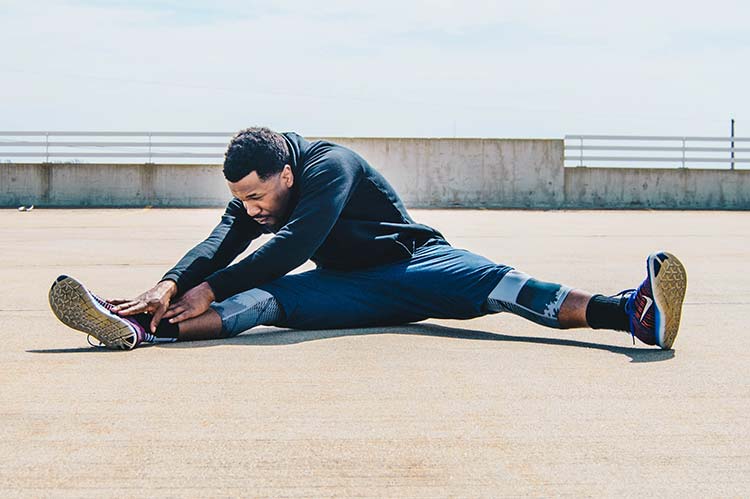
We all know that exercise is an important part of a healthy lifestyle, but if you time your workout right it can serve a second purpose in helping you fall asleep faster come nightfall.
First, you must choose the right kind of exercise. When it comes to promoting sleep aerobic exercise (such as walking, swimming or cycling) is the way to go.
These activities help through 3 mechanisms:
- Raise body heat: Sustained aerobic exercise makes you hot, and the subsequent drop in temperature after your workout is complete mimics the body’s natural cooldown that accompanies the onset of sleep.
- Beneficial Stressor: Exercise activates your nervous system’s fight-or-flight response. To compensate, your body increases the time it spends in the deeper stages of sleep. The overall result is that you feel more rested upon awakening.
- Natural Stress Relief: Exercise has been proven to decrease stress, both in the immediate present moment as well as over the long-term by altering the way we respond to stressful stimuli.
The best time to exercise is approximately 3-4 hours before bedtime. This leaves enough time for your body to cool down and relax. And you don’t need to spend an hour in the gym to benefit: 15-45 minutes per day is sufficient to see a difference in your sleep.
3. Environment

Your environment can influence your mood, energy levels and comfort — all of which have an impact on your ability to fall asleep and stay asleep.
- Mattress & Pillows: First and foremost you want to make sure your mattress and pillows are properly supporting your body throughout the night. This will relieve pressure points that cause pain and cramping, and makes it easier to get comfortable in order to fall asleep quickly.Memory foam is by far the most recommended mattress material as it easily conforms to the contours of your body. These mattresses come in a variety of densities which determine the level of firmness.Old mattresses and bedding build up with allergens that can exacerbate breathing issues while sleeping. Make sure you regularly wash comforters and pillows, and replace them every few years.
- Temperature: Sleeping in a room that is too hot or too cold makes it harder to fall asleep, causes restless sleep and even affects the amount of time you spend in REM sleep. This is related to the fact that your circadian rhythms cause changes in your body temperature at different times of day.Try to keep your bedroom between 60-70 degrees Fahrenheit (15.5 – 19 degrees Celsius) at night. The exact point of optimal comfort will depend on individual preferences.You should also be mindful of the types of clothing you are wearing to bed and what your bedding is made of to ensure they’re not trapping heat against your body.
- Light: Keeping your bedroom as dark as possible once you go to bed is the best way to ensure you sleep deeply. This means even going as far as to cover up digital clock displays and using black-out curtains. But lighting is not only important while you are asleep, you should dim the lighting in the hour before bedtime to signal to your brain that it’s time to relax.
- Noise: Environmental noises, even if you aren’t consciously aware of them, are registered by your brain while you sleep. This can lead to restless sleep, or even cause you to wake up.We can’t always turn off every noise that may disturb us during the night: Instead you can try using white noise to drown out these unwanted sounds. You can purchase a dedicated device or make use of one of the many apps available for smartphones and other devices.
- Colors: The colors you surround yourself with can have a distinct impact on how you feel. Research shows that people who sleep in blue rooms sleep longer and wake up feeling more rested.However, it’s less important that you follow some strict guidelines than simply creating a bedroom space that makes you feel relaxed and calm.
4. Bedtime Routine

Having a structured bedtime routine in place is one of the most effective ways to promote quality sleep. The trick is to form habits and rituals that help you relax and signal to your body that it’s time to fall asleep.
- Keep a sleep-wake schedule (even on weekends): By going to sleep and waking up at different times every day you’re sending conflicting signals to your body clock. Instead, stick to a relatively set sleep-wake schedule and you’ll find that overtime your body will learn to fall asleep faster and you’ll be able to wake up naturally feeling refreshed and ready to start your day.
- Avoid screens in the evening: Many of us have the habit of watching TV, browsing the internet or finishing up last minute work on our electronic devices right before bed. Unfortunately, all of these screens emit blue light that has been shown to suppress the production of melatonin — impeding sleep.It’s best to avoid these devices entirely, but if you absolutely must use them put them in night-mode to reduce your blue light exposure.
- Wind down with a relaxing activity: Incorporate a relaxing activity into your evening routine, such as reading a book, meditating or taking a hot bath. What activity you choose doesn’t matter, as long as it’s something that you find calming and helps you wind down at the end of a long day.
- Prepare your bedroom: Don’t forget to prepare your sleep environment. Turn down the lights approximately an hour before bedtime, and lower your thermostat to your ideal sleeping temperature.Additionally, making your bed in the morning has been shown to improve quality of sleep by 19%.
- Reserve your bed for sleep and intimacy: Completing work, chatting on the phone or watching TV in bed all run the risk of interfering with the association you want: That your bed is for sleeping. Affirming this association by reserving your bed for sleep and intimacy alone will dramatically reduce the time it takes you to fall asleep.
Helpful Links & Resources
Recovering from an addiction is not easy — you will encounter ups and downs along the way. What’s important is to have the proper resources at hand to help you through the rough patches. Use these resources to learn about your addiction, find treatments and support groups, and keep track of your success.
